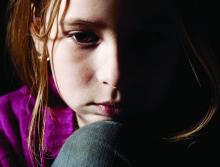The people of Fayette County, Ky., reportedly have experienced five suicides by children in the last year. The latest suicide occurred several weeks ago and involved a 12-year-old girl. This followed the suicides of children aged 10, 11, 13, and 14 years.
The deaths are not related, and there seems to be no connection to race or gender. All involved hanging, and one child might have been bullied.
The cases reflect a disturbing trend in Kentucky and across the country. In 2015, 25% of suicides of children under 17 years in Kentucky involved those aged 10-14, a 14% increase from 4 years earlier. The percentage of 6th-grade students who have thought about or planned their suicide also has climbed in recent years.
Fayette County Coroner Gary W. Ginn said the deaths in Kentucky provide another example of how events in life that might be less traumatic to adults can cause mental anguish for children, anguish which can lead some to take their own lives.
“We should be very worried to have this many cases, but we should not be hopeless,“ said Susan H. Pollack, MD, a pediatrician at the University of Kentucky Children’s Hospital, Lexington, in an interview with the Lexington Herald-Leader. She added that resources and programs are available but that stronger support systems focusing on youth are needed.
“Our families have limited options when their child needs a higher level of care. ... Local agencies often have a wait list,” Fayette County Public Schools spokeswoman Lisa Deffendall said in the article. “We have made referrals and seen it take weeks for children to get the help they need. Where do families turn when their child is in crisis? Who provides care when school is not in session?”
Rural Arizona facing crisis
Living in rural areas can prove isolating, and gaining access to health care, including mental health care, can be challenging. A segment presented on KOLD News 13 in Tucson provided yet another examples of the mental health crisis in rural America.
Cochise County is an area of about 6,200 square miles in the southeast corner of Arizona. The area, which is about eight times bigger than New York City, is home to about 125,000 people. For those with mental health issues, it’s a bleak place to live, with only two psychiatrists available and no mental health facility.
“It’s as if we got a fire going that we can’t put out,” said James P. Reed, DO, in an interview. He is one of the two psychiatrists practicing in the county. In the last 2 months alone, 64 new people have sought his help, and he has had to turn many away.
Dr. Reed has been practicing in the country for 35 years, which gives him a longer-term perspective. “It’s so much worse now. I don’t know what it is, if it’s a consequence of our society and the direction it’s going. I just can’t put my finger on it.”
The main reason behind the paucity of mental health professionals comes down to economics. Burdened with student loan debts after graduation from medical school, the low salaries of rural positions cripple the recruitment of psychiatrists and other medical professionals.
In Cochise County, as elsewhere, the main refuge for people with mental illness is jail. “We have people in there [who] really shouldn’t be in there,” said Cochise County Sheriff Mark J. Dannels. “These people need special help that I can’t provide to them. It’s almost a misjustice to have them in our jail. Unfortunately, there’s no other place to put them.”

